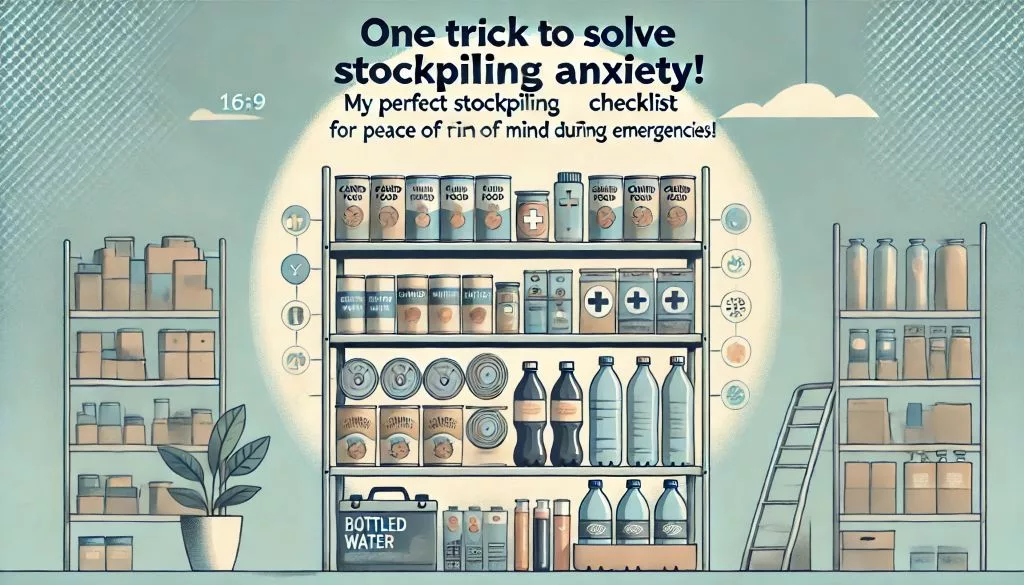Hey girls! Lately, a lot of people have been talking about stockpiling supplies, right? Unexpected events like pandemics and extreme weather make us think about how to better secure our lives. But! Stockpiling isn’t about random hoarding! Today, your one-trick-pony blogger is here to share my amazing stockpile list, so you can stop worrying and confidently handle any unexpected situation!
I. Three Soul-Searching Questions About Stockpiling:
- Question 1: What to stockpile? Don’t blindly follow the trend! Create your stockpile list based on your own situation and family needs. For example, are you a single girl living alone or a family of three? What are your eating habits? What’s your lifestyle? These all affect your stockpile list.
- Question 2: How much to stockpile? This is crucial! Stockpiling too much is wasteful, and stockpiling too little is insufficient—both are awkward! My suggestion is “enough is enough.” Ideally, calculate your monthly consumption and add some extra reserves. Don’t think about stockpiling until the end of time; it’s unrealistic!
- Question 3: How to stockpile? Stockpiling isn’t just about piling things up at home! Learn to stockpile scientifically, paying attention to expiration dates and storage methods to avoid waste! You also need to leave enough space; don’t turn your home into a warehouse!
II. My Amazing Stockpile List, Categorized! (Super Detailed Version)
1. Food:
- Staples: Rice, flour, noodles, instant noodles, biscuits, bread (choose those with long shelf lives). I personally prefer vacuum-packed rice; it has a longer shelf life and is less prone to insect infestation. For instant noodles, I recommend those with richer broths to avoid monotony.
- Meat: Frozen meat is a stockpile lifesaver! Chicken, pork, beef—I stockpile some of each for convenience. Remember to portion them, using one portion at a time to avoid repeated freezing affecting the taste. Also, you can stockpile cans like luncheon meat and fish, which have long shelf lives and are nutritious.
- Vegetables: Fresh vegetables aren’t ideal for stockpiling; they spoil easily. Consider vegetables with longer shelf lives, like potatoes, onions, garlic, or canned corn and peas.
- Seasonings: Salt, oil, soy sauce, vinegar, various seasonings—these are essential! I recommend buying smaller packages for convenience and to avoid waste.
- Drinking Water: This is a must-stockpile item! I suggest stocking up on bottled water or large bottled mineral water; it’s much more cost-effective than buying small bottles.
- Snacks: Stockpile some of your favorite snacks to boost your mood! But don’t stockpile too much; it’s easy to gain weight!
2. Daily Necessities:
- Toilet Paper: A must-stockpile item! And stockpile a lot! This is high-volume, and if you’re not careful, you’ll panic when it runs out.
- Wet Wipes: All kinds of wet wipes—disinfecting wipes, makeup remover wipes, cleaning wipes—stockpile some; they are convenient and practical!
- Bath and Body Products: Shampoo, shower gel, hand soap, toothpaste, toothbrushes—these are all everyday essentials. I suggest buying large packages for cost savings when stockpiling.
- Cleaning Supplies: Laundry detergent, dish soap, disinfectant, garbage bags, etc.—try to buy large bottles, which are also more economical.
- Medicine: Cold medicine, fever reducers, anti-inflammatory drugs, bandages, etc.—keep some common medicines at home for emergencies. Remember to keep medicines out of children’s reach!
- Batteries: Flashlight batteries, remote control batteries, batteries for various small appliances—you should have some on hand, just in case.
3. Others:
- Warm Clothing: If you live in a place with distinct seasons, stockpile some winter and summer clothes.
- Cash: Keep some cash on hand, just in case.
- Emergency Tools: Flashlight, radio, scissors, screwdriver, etc.—these tools are extremely useful in emergencies.
III. My Stockpiling Experience Sharing:
- Pay attention to expiration dates: This is the most important! Always check expiration dates, using items first and avoiding waste.
- Proper storage: Different items have different storage methods. Store them according to their characteristics. For example, rice should be stored in a cool, dry place, instant noodles should be stored in a ventilated place, etc.
- Regular checks: Regularly check your stockpile to see if there are any expired or damaged items and dispose of them promptly to avoid waste.
Stockpiling isn’t about anxiety; it’s about peace of mind. I hope my sharing helps you better handle unexpected situations and make your life more secure!
